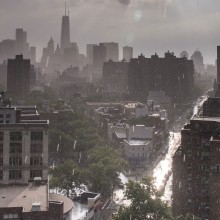
“To all of this I agreed, staying in my house and for the first time in my life attempting to cook. And the plague did not come out on me. By means of the telephone I could talk with whomsoever I pleased and get the news. Also, there were the newspapers, and I ordered all of them to be thrown up to my door so that I could know what was happening with the rest of the world.
“New York City and Chicago were in chaos. And what happened with them was happening in all the large cities. A third of the New York police were dead. Their chief was also dead, likewise the mayor. All law and order had ceased. The bodies were lying in the streets un-buried. All railroads and vessels carrying food and such things into the great city had ceased runnings and mobs of the hungry poor were pillaging the stores and warehouses. Murder and robbery and drunkenness were everywhere. Already the people had fled from the city by millions—at first the rich, in their private motor-cars and dirigibles, and then the great mass of the population, on foot, carrying the plague with them, themselves starving and pillaging the farmers and all the towns and villages on the way.
“The man who sent this news, the wireless operator, was alone with his instrument on the top of a lofty building. The people remaining in the city—he estimated them at several hundred thousand—had gone mad from fear and drink, and on all sides of him great fires were raging. He was a hero, that man who staid by his post—an obscure newspaperman, most likely.
“For twenty-four hours, he said, no transatlantic airships had arrived, and no more messages were coming from England. He did state, though, that a message from Berlin—that’s in Germany—announced that Hoffmeyer, a bacteriologist of the Metchnikoff School, had discovered the serum for the plague. That was the last word, to this day, that we of America ever received from Europe. If Hoffmeyer discovered the serum, it was too late, or otherwise, long ere this, explorers from Europe would have come looking for us. We can only conclude that what happened in America happened in Europe, and that, at the best, some several score may have survived the Scarlet Death on that whole continent.



The chance comparison in this chapter, between the whale and the elephant, so far as some aspects of the tail of the one and the trunk of the other are concerned, should not tend to place those two opposite organs on an equality, much less the creatures to which they respectively belong.
“My dear friends,” said Oz, “I pray you not to speak of these little things. Think of me, and the terrible trouble I’m in at being found out.” “Doesn’t anyone else know you’re a humbug?” asked Dorothy. “No one knows it but you four–and myself,” replied Oz. “I have fooled everyone so long that I thought I should never be found out. It was a great mistake my ever letting you into the Throne Room. Usually I will not see even my subjects, and so they believe I am something terrible.”
At this moment Derick was in the act of pitching his lamp-feeder at the advancing boats, and also his oil-can; perhaps with the double view of retarding his rivals’ way, and at the same time economically accelerating his own by the momentary impetus of the backward toss.
“The unmannerly Dutch dogger!” cried Stubb. “Pull now, men, like fifty thousand line-of-battle-ship loads of red-haired devils. What d’ye say, Tashtego;
are you the man to snap your spine in two-and-twenty pieces for the honour of old Gayhead? What d’ye say?” “I say, pull like god-dam,”—cried the Indian. Fiercely, but evenly incited by